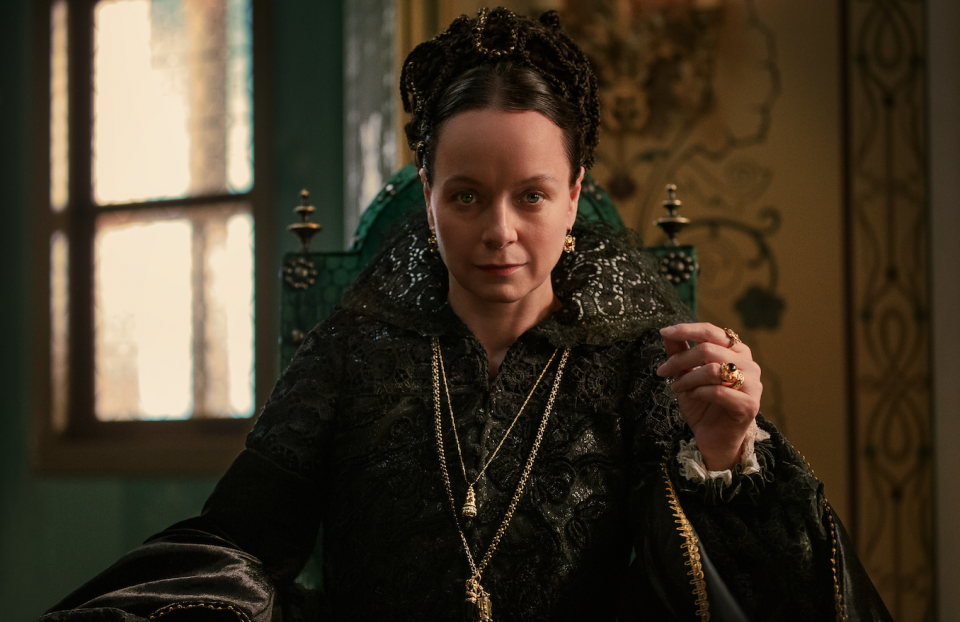Samantha Morton Channelled a Mafia Don to Play Catherine de Medici in The Serpent Queen

- Oops!Something went wrong.Please try again later.
- Oops!Something went wrong.Please try again later.
"Hearst Magazines and Yahoo may earn commission or revenue on some items through the links below."
The latest in a long line of captivating female-driven period dramas on Starz, The Serpent Queen is set in 16th century France, and chronicles the story of how Catherine de Medici rose to power in the court against all odds.
The series is based on the nonfiction book Catherine de Medici: Renaissance Queen Of France, by Leonie Frieda, and will jump between two timelines to explore Catherine's history and present. In the flashback timeline, an orphaned teenage Catherine arrives from Italy to marry King Henry II – only to discover on her wedding night that her new husband is deeply in love with another woman.
The series will then show how that naive young woman became a conniving and formidable queen, who's played in the future timeline by British actress Samantha Morton. Per the official synopsis, "with her future suddenly uncertain and with little hope of conceiving, Catherine must quickly learn who she can trust – both within her personal entourage of courtiers and the members of the royal court – while outmaneuvering anyone who underestimates her determination to survive at any cost."
At the Television Critics Association summer press tour this week, Morton discussed the "fascinating, complex, alluring, and devastating" role alongside showrunner Justin Haythe, and co-stars Ludivine Sagnier, Sennia Nanua, and Liv Hill.
"Bearing in mind she’s Italian, I had this sense that she was almost like a don in The Godfather," Morton explained. "She's someone that's very reserved. She thinks things through. She doesn't feel the need to have knee-jerk reactions to anything."
Though Catherine is often depicted as a villainous character by historians, The Serpent Queen paints a much more complex picture. "I liked the idea of a villain from history who would address us and say 'Let me you tell why I did the things I did, and you'll judge me differently'," said Haythe. "You have to really wonder if this is an evil person with shards of good, or it’s a good person who’s capable of evil to survive."
Haythe went on to point out that Catherine is brought to the court in the role of essentially "a mail-order bride", and yet ended up ruling over everybody. "She’s also kind of defined by a heartbreak, and heartbreak can look evil from a certain angle."
But in the early stages of the show, when Catherine is still new to the court, the villain of the piece is Diane de Poitiers, Henry's mistress. "She becomes a phenomenal deception for Catherine, who’s alone, who’s an orphan, who comes to a very hostile environment and she thinks she can trust her and unfortunately is going to be the biggest threat for her," Sagnier said of her character. "But she has her own reasons. She’s in love with Henry, I think sincerely. She might be perceived as evil, but to me she’s just a survivor like Catherine, because one must not forget that in those times women had no rights... and the only way they could elbow in was to be fierce and ruthless. So of course she is all that to Catherine, but she has no choice."

Surrounded by hostile forces, Catherine ends up finding power in some unorthodox places. Haythe noted that according to many scholars, Catherine was the inspiration for the evil queen in Snow White, in part because of her use of black magic.
"I saw this as a very practical, very modern story for someone who just happened to be born in the 16th century, and had to treat black magic as a practicality in a way," Haythe explained. "I mean, it’s another tool that’s available to her. But at the same time, she had ten children and was only outlived by one, which is in a way like a fairytale curse."
Morton added that the way history remembers Catherine is impossible to extricate from gendered norms. "We look back in history and women that were midwives, or understood herbs or the qualities of certain mushrooms, or prayed under a full moon, were called witches. Men are clever. Oh, they’re alchemists, they’re scientists, they’re astronomers; they’re very clever. But I think history writes women as 'devil women', or as evil, for just being incredibly clever and astute."
The Serpent Queen will premiere on Starz on September 11.
You Might Also Like

